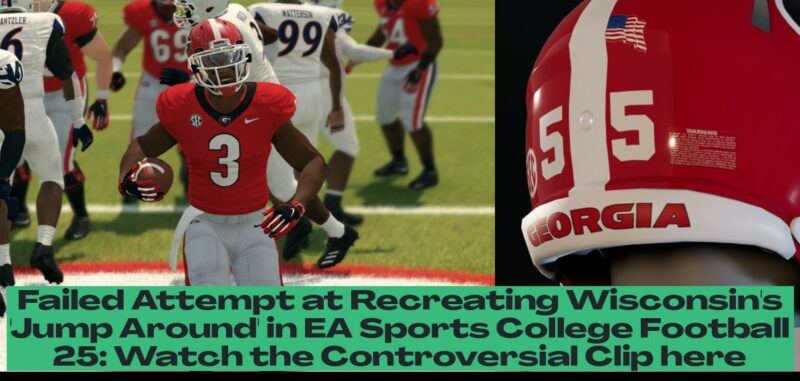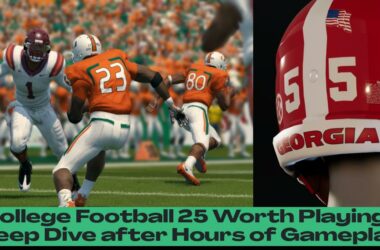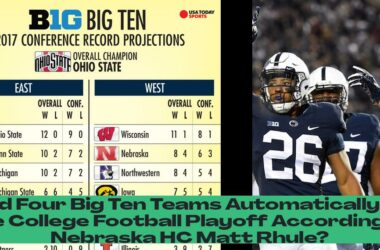WATCH: EA Sports College Football 25’s failed attempt at recreating Wisconsin’s ‘Jump Around’
EA Sports College Football 25, the highly anticipated return of the beloved college football video game series, has been met with a wave of excitement and anticipation. Fans are eagerly awaiting the chance to once again experience the thrill of virtual gridiron battles, complete with the iconic sounds and traditions that define the sport. However, one particular tradition that has generated a lot of buzz, and a fair amount of disappointment, is EA Sports’ attempt at recreating Wisconsin’s legendary ‘Jump Around’ tradition.
A recent video clip posted on X, formerly known as Twitter, gave fans their first glimpse of the game’s rendition of the ‘Jump Around’ spectacle. The short, 18-second clip shows Badger fans jumping in unison, a sight that is synonymous with the University of Wisconsin’s home games. But there’s a glaring issue: the fans aren’t jumping to the iconic House of Pain’s ‘Jump Around’ song, but rather to a different track altogether.
This unfortunate oversight stems from EA Sports’ inability to secure the rights to the mid-1990s hit, which has become an inseparable part of the ‘Jump Around’ tradition. It’s a decision that has left many Badger fans scratching their heads and wondering why EA Sports couldn’t secure the rights to such a recognizable and beloved song.
The game accurately depicts the entire crowd jumping in sync as the fourth quarter begins, but it’s impossible to ignore the jarring EDM song playing in the background. The lack of authenticity is a stark contrast to the genuine excitement surrounding the ‘Jump Around’ tradition, which has become a staple of Wisconsin’s home games for over two decades.
For anyone curious – this is what Jump Around looks like in NCAA 25 pic.twitter.com/oo9FQNJZWT
— Badger Enthusiast (@Badger_szn) July 16, 2024
One can’t help but wonder if EA Sports could have found a more suitable alternative to the iconic ‘Jump Around’ theme. While the EDM song is a decent attempt at creating a similar energy, it lacks the familiarity and cultural relevance that the original track holds. It’s a misstep that underscores the importance of getting the details right when it comes to recreating beloved traditions.
- EA Sports College Football 25’s attempt to recreate Wisconsin’s ‘Jump Around’ tradition fell short due to the lack of rights to the iconic House of Pain song.
- The game features Badger fans jumping in unison during the fourth quarter, but to a different EDM track instead of the familiar ‘Jump Around’ song.
- The oversight highlights the importance of authenticity and attention to detail when recreating beloved traditions in video games.
- Fans are left disappointed by the inauthentic portrayal, emphasizing the significance of securing rights to iconic elements that define a team’s culture.
The Legacy of ‘Jump Around’
Wisconsin’s ‘Jump Around’ tradition is more than just a catchy song played during a football game. It’s a symbol of the university’s rich history, its passionate fan base, and the unparalleled energy that fills Camp Randall Stadium on game days. The tradition has become an integral part of the Wisconsin game-day experience, bringing together students, alumni, and fans from all walks of life.
The anthem’s first rendition occurred on October 10, 1998, during a homecoming matchup against Purdue. Since then, the tradition has grown exponentially, becoming a global phenomenon recognized by fans across the country. The ‘Jump Around’ tradition has been featured on national television, has been the subject of countless articles and blog posts, and has even inspired countless imitations at other universities.
The significance of the ‘Jump Around’ tradition extends far beyond the confines of Camp Randall Stadium. It’s a symbol of the power of music and sports to unite people, creating shared experiences that transcend generations. The tradition has become a source of pride for the University of Wisconsin and its alumni, serving as a constant reminder of the school’s rich history and passionate fanbase.
The absence of the original ‘Jump Around’ song in EA Sports College Football 25 is a missed opportunity to further enhance the game’s realism and immersion. It’s a reminder of the importance of authenticity when it comes to recreating beloved traditions and cultural icons. While the game may accurately depict the physical act of jumping, it fails to capture the essence of the ‘Jump Around’ tradition, leaving many Badger fans feeling a sense of disappointment.
The Impact of the ‘Jump Around’ Omission
The omission of the original ‘Jump Around’ song has sparked a mixed reaction among fans. While some are understanding of the licensing complexities involved, many are disheartened by the lack of authenticity. Some have even suggested that EA Sports should have used a generic, non-copyrighted track instead of trying to replicate the ‘Jump Around’ tradition with a different song.
The decision to omit the ‘Jump Around’ song has highlighted the importance of licensing agreements in video game development. Video game developers often face challenges when attempting to secure the rights to popular songs, especially those with strong cultural significance. The high cost of licensing fees can often make it financially prohibitive for developers to include certain songs in their games.
Despite the challenges, many fans believe that EA Sports should have found a way to include the original ‘Jump Around’ song in the game. The song’s cultural significance and its integral role in the Wisconsin game-day experience make it an essential part of the university’s identity. The omission of the song has been viewed by many as a missed opportunity to further enhance the game’s immersion and authenticity.
Beyond the ‘Jump Around’ Controversy
While the ‘Jump Around’ omission has generated a fair amount of buzz, it’s important to remember that EA Sports College Football 25 is still a highly anticipated game. Fans are eager to experience the return of the beloved franchise and to once again compete against their friends and rivals in the virtual world of college football.
Aside from the ‘Jump Around’ controversy, EA Sports College Football 25 has been met with a wave of positive feedback. The game’s graphics, gameplay, and roster updates have been praised by fans and critics alike. The game’s developers have also made significant strides in improving the overall game experience, with new features and gameplay mechanics that aim to enhance the realism and immersion of the game.
Despite the ‘Jump Around’ omission, EA Sports College Football 25 promises to be a worthy addition to the legacy of the franchise. The game’s developers have put a lot of effort into creating an authentic and enjoyable experience for fans, and the game’s overall quality is a testament to their hard work and dedication.
The Future of ‘Jump Around’ in Video Games
The ‘Jump Around’ controversy has raised important questions about the future of iconic traditions in video games. As video games become increasingly realistic and immersive, developers are faced with the challenge of capturing the essence of real-world experiences, including the nuances of cultural traditions.
The inclusion of iconic songs and traditions in video games can enhance the game’s authenticity and immersion. However, the high cost of licensing fees and the complexities of securing rights can make it difficult for developers to include certain elements in their games. The ‘Jump Around’ controversy highlights the need for developers to find creative solutions to overcome these challenges.
One solution could be to explore alternative licensing models that allow developers to use iconic songs and traditions in their games without incurring exorbitant costs. Another solution could be to work with universities and other institutions to secure the rights to use copyrighted material in a way that benefits both parties.
As video games continue to evolve, it’s important for developers to remain mindful of the cultural significance of traditions such as ‘Jump Around’. By finding creative solutions to the challenges of licensing, developers can create more authentic and immersive experiences for players, while also celebrating the rich history and traditions that make sports so special.









